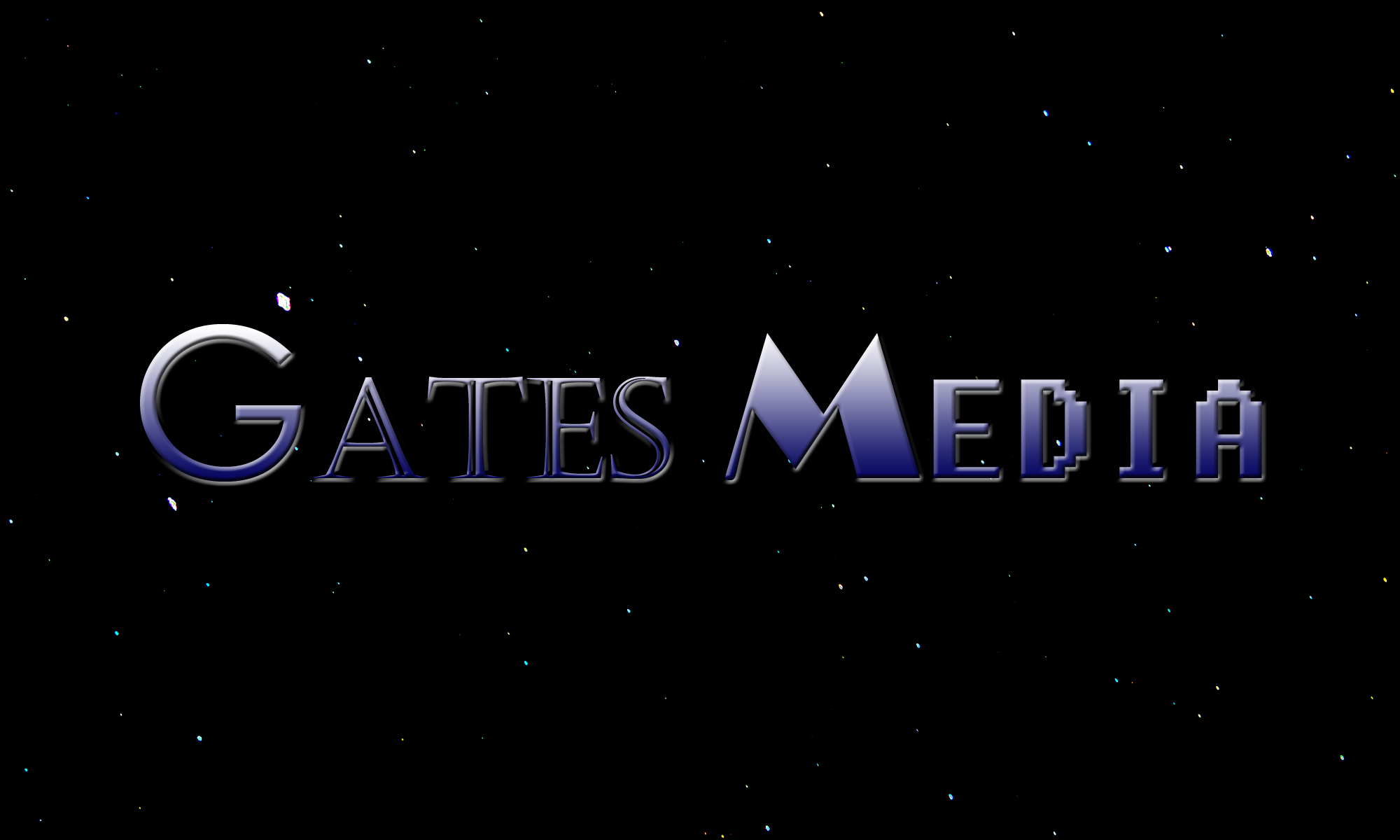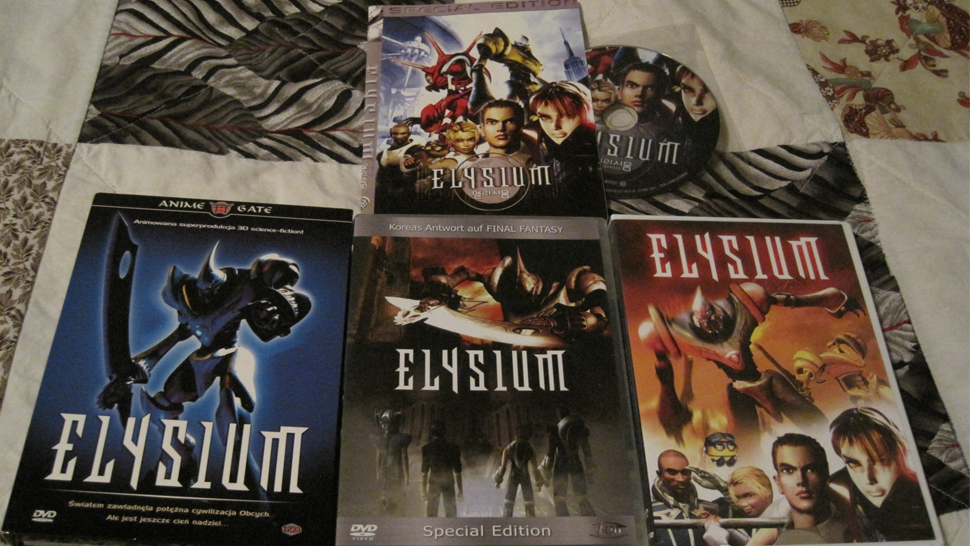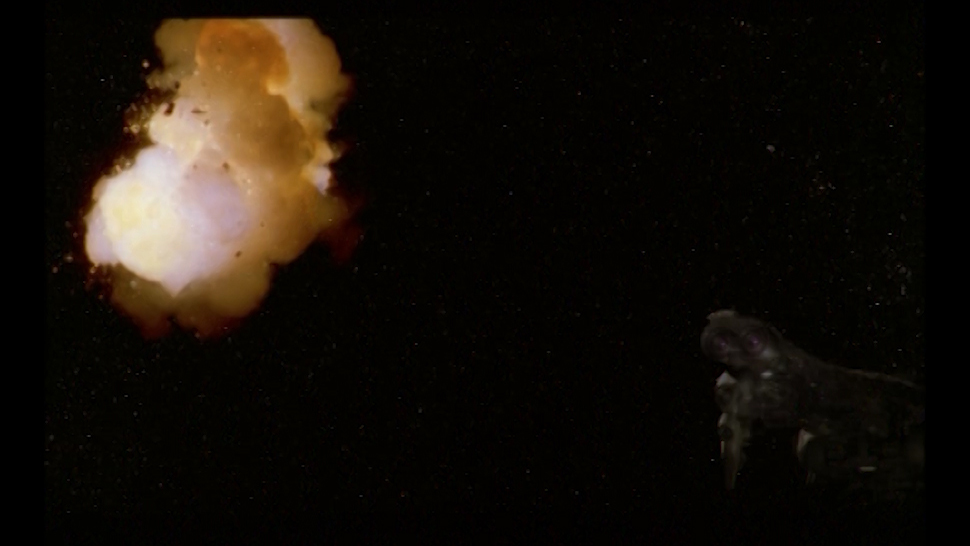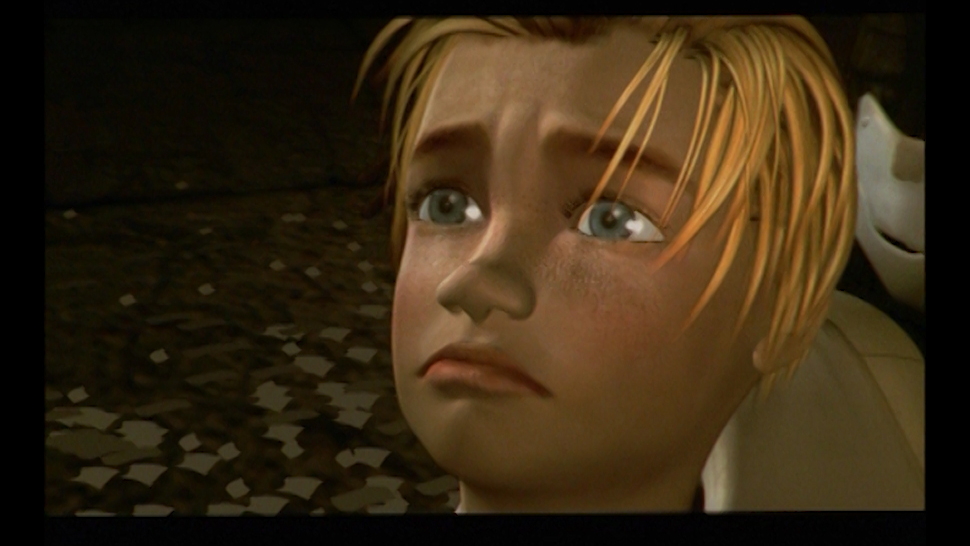Originally published on the Extra Life Community website
Edited by Jack Gardner
Sometime in the early 2000s, my mother purchased a 3D movie viewer and glasses for our TV and some 3D movies from eBay and other online retailers. Included was Elysium, a CGI film mailed without a case in a package that appeared to be addressed in Chinese. This movie, mistakenly believed to be 3D, ended up sitting in a box, unwatched until 2013. Shortly after I began critiquing odd, obscure, and adult-oriented CGI movies for fun, I happened to remember the foreign film my siblings, cousins, and I abandoned more than a decade earlier in favor of Frankenstein and Night of the Living Dead in 3D. Ever since, it has humored, shocked, and baffled me. The film shows signs of tampering with places where the audio cuts out and sloppy video editing. The English adaptation is extensively re-edited from the original film and, oddly, includes thirteen minutes of brand new footage. Redubs of the film from other countries are translations of the English script rather than the original and include a bizarre collection of special features on their DVDs. Most people would have discounted Elysium as a half-baked attempt at a giant robot anime gone terribly wrong, but instead, I set out to find how the movie came to be. While I wasn’t entirely successful, I did discover many strange things surrounding what has been referred to as the Final Fantasy of South Korea.
Its proximity to the release of Final Fantasy: The Spirits Within (2001) and video game-like graphics earned Elysium (2003) its comparison to Square Picture’s film, and it roughly follows the “heroes come together to save the world” storyline seen in many Final Fantasy games. Van, a bike racer and pizza delivery boy; Paul, a juvenile delinquent; Christopher, a fighter pilot; and Nyx, an alien from the planet Elysium, are chosen to pilot four giant armors and protect the Earth from evil. Together they must defeat Necros, the general of the Elysium army who started a war between the Elysium and humans to set his plans to gain power into motion.
The first time I watched this film, however, its problems were more apparent than its story or its tenuous resemblance to Final Fantasy. It suffered from bad animation and special effects, poor writing, and most of all, frantic editing that made the story nearly incoherent. Robots and spaceships exploded like Death Stars. The attempts that characters made at displaying joy, horror, or terror with their plastic faces had more hilarious than successful results. The subtitling was sometimes comically bad, but even if it were flawless, the film had little room to explain itself. It was edited together so chaotically that it lost all sense of time and place. Transitions to move characters from one location to another were missing. Instead, characters traveled an impossible distance, like from a space ship to the middle of a city, in a single shot or disappeared mid-scene, making it seem like they could teleport. Some scenes, particularly battles, seemed to be composed of shots that had been placed in a random, nonsense order. The film often jumped between scenes to suggest that multiple events occurred at the same time or sequentially. Sometimes, however, the scenes placed together couldn’t reasonably happen at either of those times, and the film made no attempt to explain when they occurred or to even provide a transition between them to suggest time passing. This problem was so prevalent that anywhere from a few days to a few years could have passed in the course of the movie.
Also on the DVD, I discovered, shockingly, a short “The Making Of” film. In it, the creators showed off their use of motion capture and their attention to continuity, which the film seemed to lack entirely. Someone at some point cared about and showed pride in this hacked-together film. Who? What were they trying to achieve, and why did it fail so completely?
I looked to the Internet for answers. Unfortunately, all that I found was a tiny Wikipedia article, an incomplete IMDB page, and a small number of reviews, half of which weren’t in English. The official website had become what appeared to be a website for a park. All that anyone seemed to know for certain was that the film was made in South Korea. Even simple plot summaries were wrong half the time. At the time this article was written, one website claimed it was a wartime drama that took place in Budapest and was based on a true story. A reviewer claimed that Elysium (2013) was a remake of Elysium (2003), to which it bore no resemblance. Even the official IMDB page claimed that “the story is about the message, only love for humanity can save the earth.” I couldn’t see how anyone could pull that out of the series of images I watched. Even stranger, some user reviews praised Elysium for its superb animation and reasonable, well-told story. Excuse me? Had we watched the same movie?
As it turned out, we hadn’t. During my search, I found to my delight that the film had been redubbed in English. The only way the film could possibly be worse, and more hilarious, would be to give it a terrible English dub. Naturally, I absolutely had to have it. I bought one of the last remaining copies from the dark corners of Amazon. With actors who clearly didn’t care, obvious and badly improvised lines, and weird dialog that didn’t match the film, the redub was as amazing as expected. Crispin Freeman, a popular voice actor in English dubs of anime, who voices Kronos and Lycon in Elysium, was about the only actor who gave a consistently decent performance. Differences in the script, however, made the story more coherent. Primarily, an added narrator tied together starkly cut together scenes and provided a better sense of time passing.
As I continued to watch the two dubs of the film in preparation to review Elysium though, I noticed something else. I was watching the English version of the movie when the protagonist Van made a tasteless joke about bulimia. I’d just watched the Korean version the previous day, but I couldn’t remember Van joking about bulimics in it. More than likely, he’d made a different joke, he spoke about something else, or the subtitles were indistinguishable. I wondered though, so I opened the Korean film and looked for the scene. To my surprise, the part of the scene where Van made the joke didn’t exist. Comparing the length of the two films, I realized that the English dub was thirteen minutes longer than the original film.
I proceeded to go through both versions of Elysium and map out the differences between them. While they told basically the same story, they were edited together much differently. The scenes appeared in different orders, the English version had shots and entire scenes that the Korean version didn’t, and the Korean film also had shots that didn’t exist in the English film. While the English adaptation was still a mess, it was overall better paced and better put together than the Korean film. Going to my experience with English dubs of Japanese anime, I knew that sometimes adaptations were also re-edited to add or remove elements in the footage or reorder scenes and shots to tell a different story, but the English adaptation of Elysium contained seemingly brand new content that someone animated and rendered!
By this point, I was seriously questioning the DVD that came without a case in that package addressed in Chinese all those years ago. I thought I had the original Korean film, but clearly, more footage existed. As I watched it again, I could see and hear where the scenes were abruptly cut off where they continued in the English version as if someone had butchered the film to make it shorter. If I didn’t have the original film, then what did I have? I again went back to my experience with Japanese anime, specifically bootlegs of anime. Perhaps I had some crazy Chinese import. These ethically questionable, if not illegal, purchases are usually cheap and have Chinese subtitles and poor English subtitles. My supposed Korean copy of Elysium fit this description. Why would bootleggers take the time to re-edit the film, and make it worse, though? They don’t even subtitle properly.
If I wanted to answer these questions, I needed more copies of the movie. Perhaps I had some early edit of Elysium that mistakenly released to the public, and somewhere out there the actual original Korean film, one even more complete than the English adaptation, existed… Or maybe whoever wanted to redub the movie in another language got a box of footage to edit together. The only DVD of the movie I could find that had a Korean audio option was the German DVD. It claimed to be of the same length as the English version. I also found a Polish adaptation that claimed to be of a different length than the Korean and English versions. I found a French DVD on eBay, too, but I’d already nearly emptied Amazon of its copies. I didn’t want to get too crazy with this terrible movie.
The Polish DVD was perfect for any Elysium fan’s shelf and, simultaneously, the most bizarre DVD I’d ever seen. In its beautiful packaging were five Elysium trading cards, words that I never thought I would say let alone use to describe real objects. The DVD had well-designed, interesting menus and included character descriptions and the name of the armor each character pilots, information that wasn’t revealed in the movie. Contrary to its description online, it contained the English version of the film with Polish and English audio options. Things got weird starting with the Polish dub, which featured one guy repeating all the dialog in Polish over the English dub. The DVD also contained descriptions of about 186 random movies, from Rudolf the Red Nosed Reindeer to Kill Bill, and samples of all the songs from seven CDs that had nothing to do with Elysium. Most of the music was electronica. I could dig that.
Anyway, the German DVD proved to be more relevant to my search, but it left me with more questions than answers. “Is the Korean on this DVD actually Korean?” was among them. The DVD, subtitled “Koreas Antwort auf Final Fantasy,” which Google translated to “Korea’s answer to Final Fantasy,” contained the English version of the film with German, English, and Korean audio options and German subtitles. The Korean audio, however, didn’t contain a full-length version of the dub on my Korean DVD as I expected. The voice actors were different, and the script was obviously translated from the English dub. Most bothersome of all, the dialog didn’t sound like Korean. I wasn’t super familiar with Korean, but I knew that something was strange. At times, it sounded similar to Spanish and other times it sounded more like Chinese. I asked the Internet, but as of this writing, I still don’t have a definitive answer to what language it is. Early opinions concur; it isn’t Korean.
Unlike the twenty plus games and movies that Japan’s Final Fantasy spawned, Korea’s Final Fantasy truly is a final fantasy. Thirteen years after its release, Elysium has been nearly forgotten, leaving strange artifacts behind. Among them is the original Korean film stitched together like Frankenstein’s monster, a “The Making Of” featurette showing the care that went into creating it, thirteen minutes of previously unseen footage that appeared in the English dub without explanation, and a German DVD with a “Koreanisch” audio option that doesn’t sound Korean. Someone saw enough potential in the original film to not only redub it but also extensively re-edit it. Similarly, someone saw enough potential in the mediocre English redub to translate it into other languages and package it in nicely crafted DVDs. These adaptations, however, buried the original film and left a trail questions, “What went wrong?” being the biggest among them. While these DVDs remain enigmatic mysteries, I continue on my search for answers.




